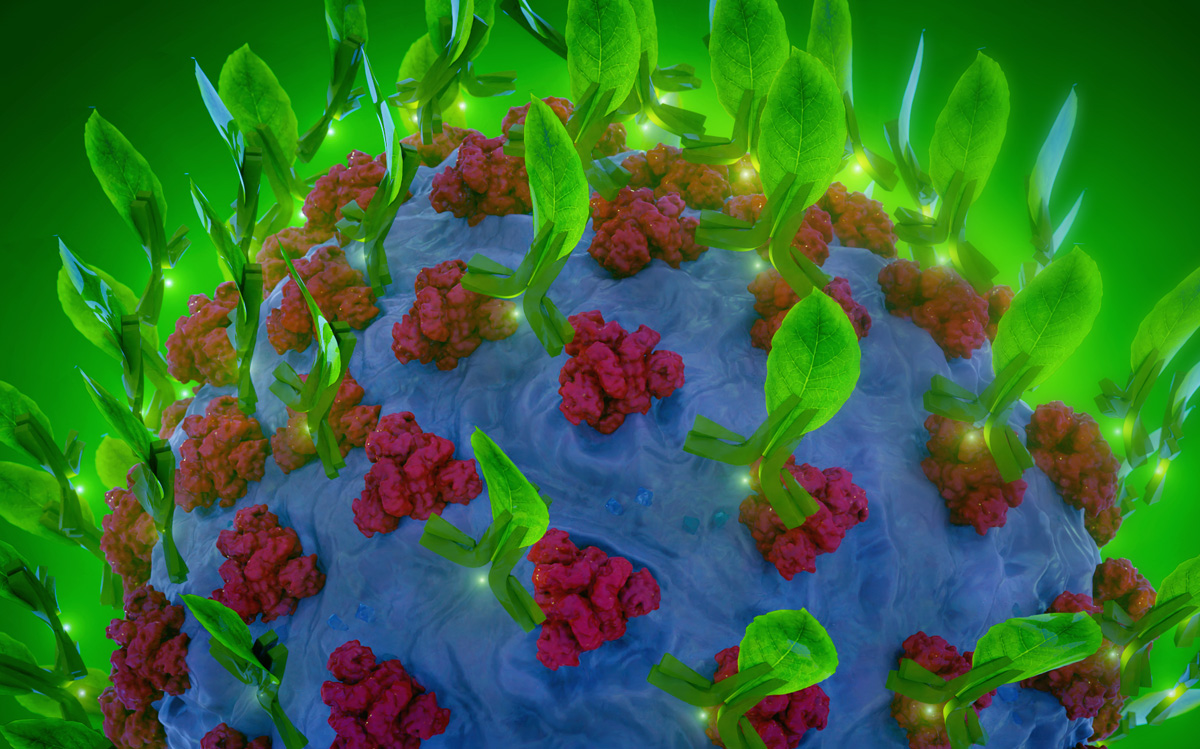
New COVID-19 Therapy Uses Plants
March 1, 2023| |
New research led by Shawn Chen, a researcher with the Arizona State University's Biodesign Center for Immunotherapy, Vaccines and Virotherapy and School of Life Sciences, describes an innovative therapy for COVID-19, using transient expression in tobacco plants to develop and produce a monoclonal antibody, or mAb. This therapy may protect against COVID-19, even as the virus attempts to evade immune detection through mutation.
Monoclonal antibodies help reduce the severity of COVID-19 by blocking the virus's entry into human cells, reducing viral load, and triggering the immune system to fight off the infection. Class 1 and 2 mAbs that are now commonly used against COVID-19 are highly potent and can neutralize a specific variant of the virus by targeting the receptor-binding domain of the SARS-CoV-2 spike protein. However, the virus can sometimes outmaneuver such therapies. Instead of binding with the ACE2 receptor-binding domain, the novel class 4 mAb in the new study targets a site that is distant from the ACE2 binding domain yet can effectively neutralize multiple variants of concern, including Omicron variants.
The treatment could be particularly useful for people with compromised immune systems and elderly patients who are highly vulnerable to SARS-CoV-2 and its emergent variants. The new therapy could also be added to existing therapies for COVID-19, significantly enhancing their protection.
COVID-19 therapies using plants have several advantages as plants can produce large quantities of therapeutic proteins in a relatively short amount of time. They are inexpensive to grow and maintain and do not host human pathogens so their use reduces the risk of contamination with infectious agents. Finally, plant-based expression systems can be rapidly reprogrammed to produce new therapeutics in response to emerging pathogens such as SARS-CoV-2, making them an attractive option for pandemic response.
For more details, read the article in ASU News.
| |
You might also like:
- The Role of Plant Biotechnology Against SARS-CoV-2
- Medicago Announces Positive Results of Trials for its COVID-19 Vaccine Candidate
- COVID-19 Treatment Efforts Using Plant Technologies
Biotech Updates is a weekly newsletter of ISAAA, a not-for-profit organization. It is distributed for free to over 22,000 subscribers worldwide to inform them about the key developments in biosciences, especially in biotechnology. Your support will help us in our mission to feed the world with knowledge. You can help by donating as little as $10.
-
See more articles:
-
Plant
- Genomics Expose Possible Weaknesses of Wheat Fungus
- Iron Boosts Rice Immune System
- China Expected to Commence GM Corn Planting
- Study Reveals Role of Activator Gene in Tomato Growth and Ripening
- Argentina-based GDM Prepares to Launch 13 GM Soybeans in South Africa
-
Animal
- Animal Biotech Vital to Empowering Farmers and Achieving Environmental Goals
-
Food
- FAO Recommendations Collective Effort to Transform Agri-food Systems in Africa
- UK Consumers Weigh Appeal of Cultured and Plant-based Meat
-
Health
- New COVID-19 Therapy Uses Plants
-
Read the latest: - Biotech Updates (February 4, 2026)
- Gene Editing Supplement (January 28, 2026)
- Gene Drive Supplement (February 22, 2023)
-
Subscribe to BU: - Share
- Tweet

